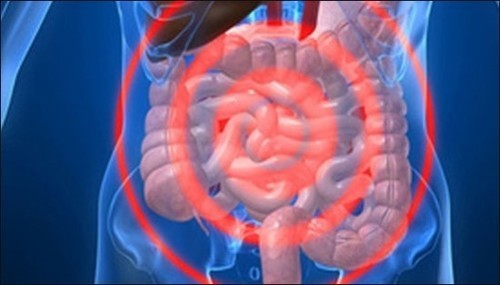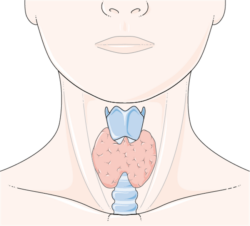The gastrointestinal (GI) tract, long thought to be specific only to the process of digestion, starts at the mouth and ends at the anus. Modern research has revealed that it has a very complex relationship with the rest of the body, especially the brain, and this post is aimed at giving the reader a glimpse of this research.
The Impact of Medication on the GI Tract
Every year many new medications are approved for clinical use, several of which can cause clinically significant GI tract toxicity. An article in the medical literature describes the drug-induced injury to the fragile lining of the tract. A drug by the name of Flagyl is used for resistant bacterial infections. Its chemical name is metronidazole and occasionally it results in the complication of encephalopathy (brain disease). It has been proposed that the adverse effects of the drug may be due wholly or in part to its conversion to a thiamine analog (the drug has a similar formula to thiamine and acts as an antagonist to the action of the vitamin). It seems that this happens enough that a Metronidazole Toxicity group has been formed online and has a considerable number of people with complaints regarding the use of this drug. Because the encephalopathy is said to be uncommon, it is apparently accepted as an occasional side effect, even though many people have been crippled from its use. The number of people reporting serious symptoms in the Toxicity group tends to negate the conclusions of officialdom that this encephalopathy is “uncommon, if not rare”.
Thiamine Deficiency and Obesity
This is defined by a formula known as the body mass index. Obesity is a growing worldwide epidemic currently affecting one in 10 adults. In the United States the incidences is as high as 40%. A publication claims that the only proven long-term treatment of severe obesity is surgical modification of the gastrointestinal anatomy, termed bariatric surgery. Complications are seen in patients who fail to follow the recommended changes in lifestyle. They include nausea, vomiting, so-called dumping syndrome, acid reflux and nutritional deficiencies. The authors note that “despite caloric density, the diet of patients prior to bariatric surgery is often of poor nutrient quality“. Unfortunately it needs to be pointed out that it is exactly why they became obese in the first place. Bariatric surgery is “shutting the stable door after the horse has gone”. Although obesity has been viewed traditionally as a disease of excess nutrition, the evidence suggests that it may also be a disease of malnutrition. Thiamine deficiency (TD) was found in as many as 29% of obese patients seeking bariatric surgery. They can present with vague signs and symptoms. In many posts on this website it has been pointed out that high calorie malnutrition is a widespread scourge in America and is responsible for the high incidence of obesity. The “vague signs and symptoms” are typical of early TD (beriberi) and are often misdiagnosed as psychosomatic.
Constipation or Diarrhea
The commonest form of bypass surgery for obesity, without going into the details, is known as Roux-en-Y. I do not know the reason for this nomenclature, but for surgeons it defines the technique. A publication in the medical literature described thiamine deficiency after gastric bypass and hypothesized that this is common. Of 151 patients, 27 met the criteria for thiamine deficiency, a prevalence of 18%. Eleven of these patients reported constipation after the surgery and treatment with thiamine improved it.
A 29-year-old patient has been described who had experienced sudden blindness and a disturbance of consciousness after two months of chronic diarrhea and minimal food intake. Amongst other physical signs, hemorrhages were seen in the eye. Leaking of blood from capillaries has long been recognized as a phenomenon that might be found in thiamine deficiency. It is of particular interest that the examination of cerebrospinal fluid revealed it to be normal, but magnetic resonance imaging showed changes that were interpreted as typical of thiamine deficiency. After administration of intravenously administered thiamine, both visual acuity and the visual field rapidly improved with the simultaneous recovery of consciousness. No indication was provided to explain a two-month period of diarrhea, although it was accompanied by “minimal food intake”.
A patient with Crohn’s disease and long-standing diarrhea resulted in combined thiamine and magnesium deficiency. Despite massive doses of thiamine given intravenously the symptoms of the deficiency could not be suppressed until the magnesium deficiency was also corrected. Many posts on Hormones Matter have discussed the relationship of magnesium with thiamine. Both of them work together as cofactors for a number of vitally important enzymes that govern energy metabolism. Obviously, literally any lapse of health can occur if energy is insufficient to meet the demands of living. Therefore, it is possible to understand that fatigue and other disorders related to ulcerative colitis and Crohn’s disease are the manifestation of an intracellular mild thiamine deficiency.
It is important to note that, in spite of finding the levels of thiamine and thiamine pyrophosphate in the blood to be normal, 10 patients out of 12 showed complete regression of fatigue and 2 patients showed partial regression when thiamine was administered. Note the doses of thiamine that were given. They ranged from 600 to 1500 mg/day given by mouth. The thing to understand here is that this was not simple vitamin replacement. These authors were using thiamine as a completely non-toxic drug, revealing genuine pioneering. Other authors have noted that micronutrient deficiencies occur in Crohn’s disease. They reported two patients with Crohn’s disease who complained of sudden-onset eye and brain dysfunction and confusion while receiving prolonged total parenteral nutrition. Magnetic resonance imaging allowed definitive diagnosis of Wernicke encephalopathy, a well-known brain disease occurring as a result of thiamine deficiency.
The Gut – Brain Connection
Within the last decade, the complement of bacteria living in the human bowel, now known as the gut microbiome, has become a focus of attention. The GI tract was once regarded simply as a digestive organ, but recent research has led to finding that the microbiome may have an impact on human health and disease. Surprisingly, it has become a focus of research for those interested in the brain and behavior. Multiple routes of communication between the gut and the brain have been established. Recently the gut microbiota (the complement of bacteria) has been profiled in a variety of conditions, including autism, major depression and Parkinson’s disease. Of course, there is still debate as to whether or not the changes observed are primary in causing the disease or merely a reflection of it. Other authors have raised the question of the importance of the microbiota in the pathology associated with autism, dementia, mood disorders and schizophrenia. It is interesting that the GI microbiome has been regarded as a complex ecosystem that reportedly establishes a symbiotic mutually beneficial relation with the host. It is said to be rather stable in health, but affected by age, drugs, diet, alcohol and smoking. Smoking leads to modifications of the bacterial complement and is linked with absence of a protective effect toward ulcerative colitis, and deleterious for Crohn’s disease.
An interesting slant has been placed on this problem of relationship between the host and the bacteria which make up the microbiome. It is pointed out that thiamine is an essential cofactor for all organisms, including bacteria and the role that gut microbes play in modulating thiamine availability is poorly understood. Little is known about how thiamine impacts the stability of microbial gut communities. In order to study this, a model gut microbe (Bacteroides thetaiotaomicron) was chosen. The study showed that thiamine acquisition mechanisms used by this microorganism not only are critical for its physiology and fitness but also provide the opportunity to model how other gut microbes may respond to the shifting availability of thiamine in the gut. Importance of this means that the variation in the ability of gut microbes to transport, synthesize and compete for thiamine is expected to impact on the structure and stability of the microbiota. The authors conclude that this variation may have both direct and indirect effects on human health.
The Role of Energy Metabolism
The question of whether bacterial changes in the gut are primary or secondary makes us think of which is the “chicken” and which is the “egg”. Bacteria are complex one-celled organisms and they require energy to perform their normal function, just the same as our body cells. Therefore, thiamine is as important to bacteria as it is to us, bringing us back to considering the frontier of medical thinking that energy metabolism is the core issue of health and disease.
We Need Your Help
More people than ever are reading Hormones Matter, a testament to the need for independent voices in health and medicine. We are not funded and accept limited advertising. Unlike many health sites, we don’t force you to purchase a subscription. We believe health information should be open to all. If you read Hormones Matter, like it, please help support it. Contribute now.
Yes, I would like to support Hormones Matter.
Image by Andrew Martin from Pixabay.
This article was published originally on May 6, 2019.



















